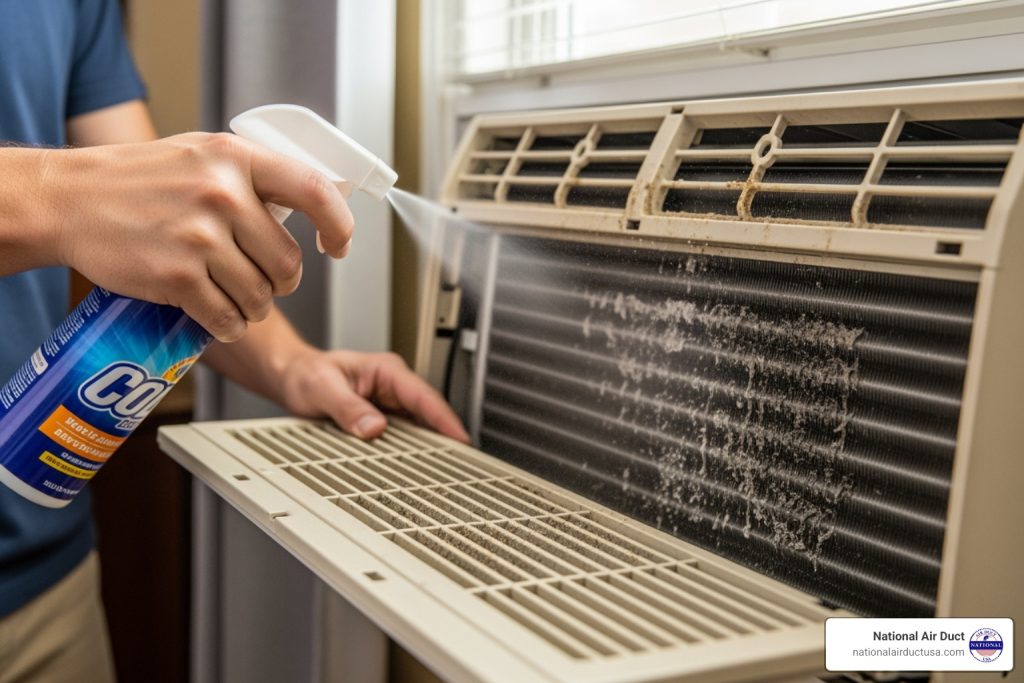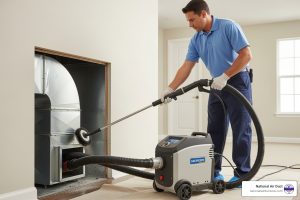Why Your Window AC Needs the Right Coil Cleaner
Coil cleaner for window ac units can transform a struggling, energy-wasting appliance into an efficient cooling machine. When your window AC takes forever to cool your room or your energy bills keep climbing, dirty coils are often the culprit.
Quick Answer: Best Coil Cleaner Types for Window AC Units
- Foaming Cleaners – Best for heavy buildup and stubborn dirt
- Self-Rinsing Cleaners – Most convenient, no water hose needed
- Non-Foaming Cleaners – Gentler option for delicate fins
- Bio-Enzymatic Cleaners – Continuous cleaning action with live enzymes
Customers report their AC units blow “considerably colder” after using coil cleaner, with some seeing dramatic performance improvements—like dropping 5 degrees in just 30 minutes.
Your window AC’s coils work like a car radiator – they need to transfer heat efficiently. When dust, dirt, and grime coat these coils, your unit works harder, uses more energy, and struggles to keep you comfortable. Clean coils mean better cooling, lower energy bills, and healthier indoor air.
The challenge? With dozens of coil cleaners on the market, choosing the right one can feel overwhelming. Some are foaming powerhouses that tackle heavy buildup, while others offer gentle, no-rinse convenience.
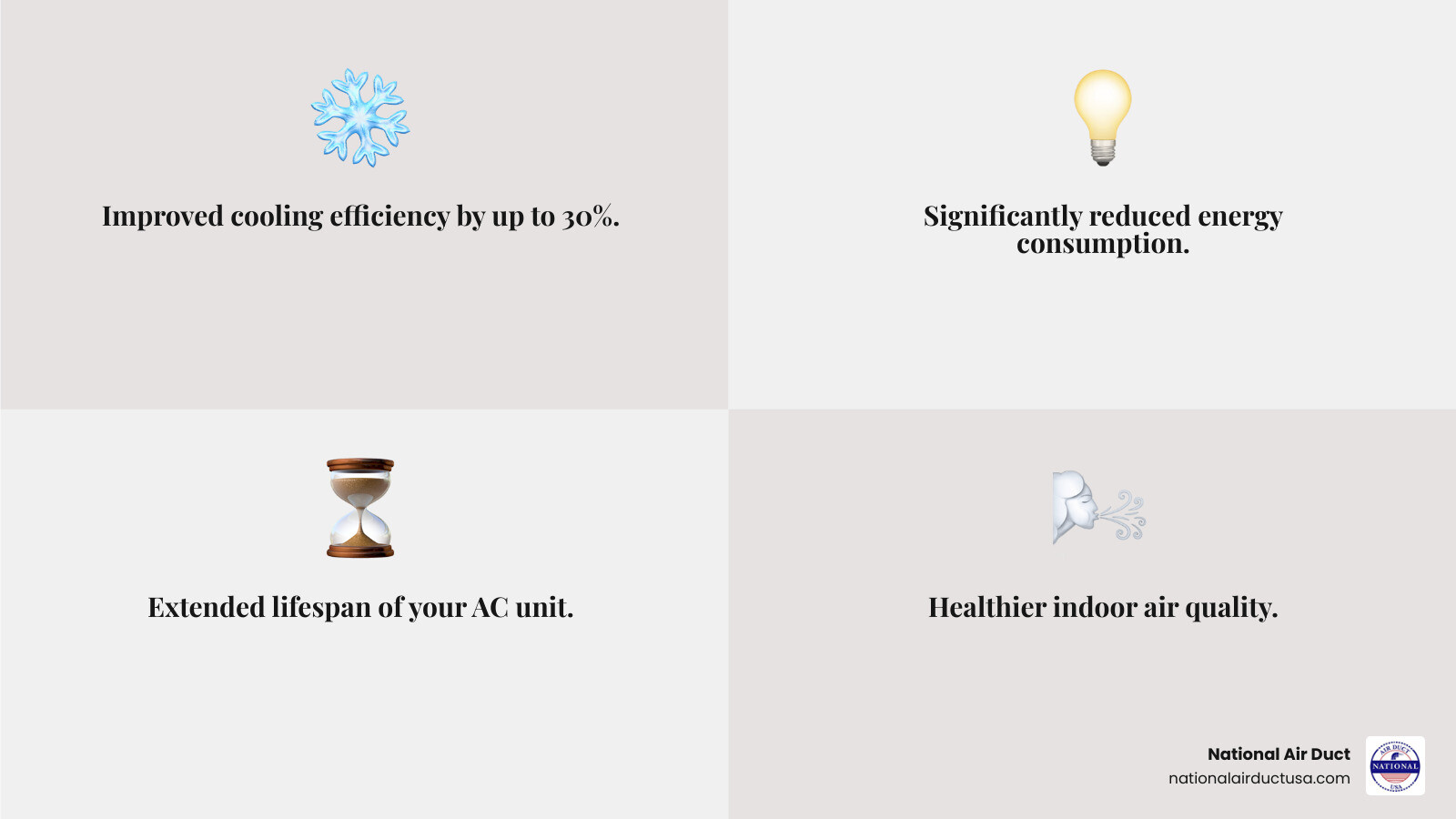
Why Clean Coils are the Secret to a Better Window AC
Think of your window AC like a circulatory system – when pathways get clogged, it struggles. Regular maintenance with a coil cleaner for window ac is the key to open uping your unit’s full potential.
Inside your window AC, two sets of coils work in harmony. The indoor evaporator coils pull warmth and humidity from your air. The outdoor condenser coils release that absorbed heat outside. This heat exchange process is your AC’s superpower, but it requires clean coils for free airflow. Over time, the delicate metal fins collect dust, pet hair, and pollen, which builds into a thick, insulating blanket.
When airflow blockage occurs, your AC essentially suffocates. The coils can’t transfer heat effectively, forcing the system to work overtime. This leads to several problems:
- Reduced efficiency: Your AC may run constantly without reaching the set temperature. The compressor and other components strain against the dirty barrier on the coils.
- Increased energy consumption: A dirty AC unit wastes electricity, sending your utility bills soaring. Clean coils allow your system to cool efficiently.
- Shorter unit lifespan: The constant strain on components wears them out faster. Regular coil cleaning is like preventive medicine for your AC.
- Mold and mildew growth: Dirty, damp coils are a perfect breeding ground for mold, which releases spores into your breathing air.
Cleaning your coils leads to improved air quality by removing dust, mold, and other contaminants. It also provides odor prevention, eliminating the musty smells that signal mold or mildew. Clean coils transform your window AC into an efficient machine that protects your comfort and health. For comprehensive indoor air quality solutions that go beyond your AC unit, check out More info about our Services.
Choosing the Right Coil Cleaner for Your Window AC
Finding the perfect coil cleaner for window ac unit is like choosing the right tool for a job; it should match the mess and the effort you’re willing to put in. The “right” cleaner depends on your coil’s condition, your desire for convenience, and your preference for eco-friendly options.
- Foaming cleaners are the workhorses for heavy buildup. They create a rich foam that clings to coils, breaking down stubborn dirt so it washes away easily.
- Self-rinsing cleaners are all about convenience. After you spray them on, your AC’s natural condensation does the rinsing. No water hose or manual cleanup is needed.
- Non-foaming cleaners offer a gentler approach, ideal for regular maintenance or delicate fins. They typically require manual rinsing but give you more control.
- Bio-enzymatic cleaners use live enzymes to break down organic matter. They are an environmentally conscious choice, providing ongoing cleaning action and excellent odor neutralization.
What to look for in a coil cleaner for a window ac
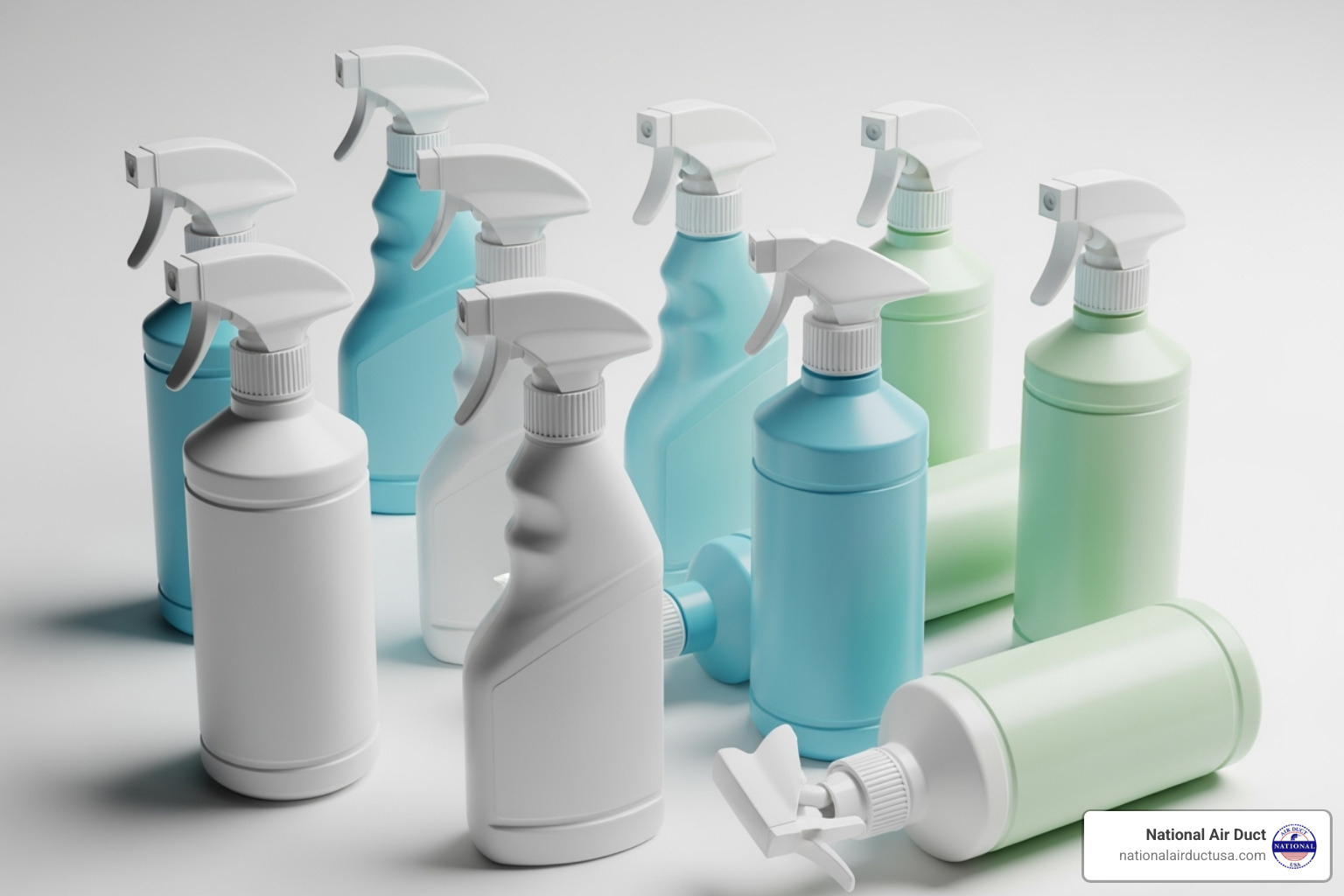
When shopping for a coil cleaner for window ac unit, look for these key features:
Foaming action is your friend. The best cleaners create a thick foam that expands and clings to coils. This helps the cleaner stay in contact with dirty surfaces longer, giving it time to break down grime. It also reaches into narrow spaces between fins where a liquid cleaner might just drip through.
Look for products with serious penetration power that dissolve buildup instead of just sitting on the surface. A good cleaner will loosen even stubborn deposits so they rinse away completely.
Self-rinsing convenience is a game-changer. These formulas work with your unit’s natural condensation action. As your AC creates condensation, the moisture carries away the dissolved dirt and cleaner, requiring no manual rinsing.
Non-corrosive properties are essential. Your AC’s components need protection. Look for acid-free formulas that are tough on dirt but gentle on metal. A good cleaner will specifically mention that it’s safe for aluminum fins and won’t harm drain pans or other materials.
Self-Rinsing vs. Manual Rinsing: What’s the Difference?
The choice between self-rinsing and manual-rinsing cleaners comes down to convenience versus control.
Self-rinsing cleaners offer maximum convenience. These no-rinse formulas use your AC’s natural condensation rinsing mechanism to wash away the dissolved grime and cleaner. As your unit runs, condensation forms on the coils and carries the dirt into the drain pan. This is perfect for units that are difficult to access.
Manual rinsing gives you more control. After the cleaner sits, you actively rinse the coils with water (a gentle hose spray for outdoor units, a spray bottle for indoor). This approach ensures thorough cleaning because you can visually confirm all dirt and residue are flushed away. For heavy soil, manual rinsing often delivers better results.
When to manually rinse a “no-rinse” product: If your coils are exceptionally dirty, or if you still see grime after using a no-rinse product, a manual rinse is a good idea. This ensures no residue is left behind that could affect performance. Just be careful with water around electrical components.
A Step-by-Step Guide to Cleaning Your Window AC Coils
Cleaning your window AC coils is a DIY task that significantly improves performance and longevity. With the right tools and a careful approach, your AC will reward you with cooler air and lower energy bills.
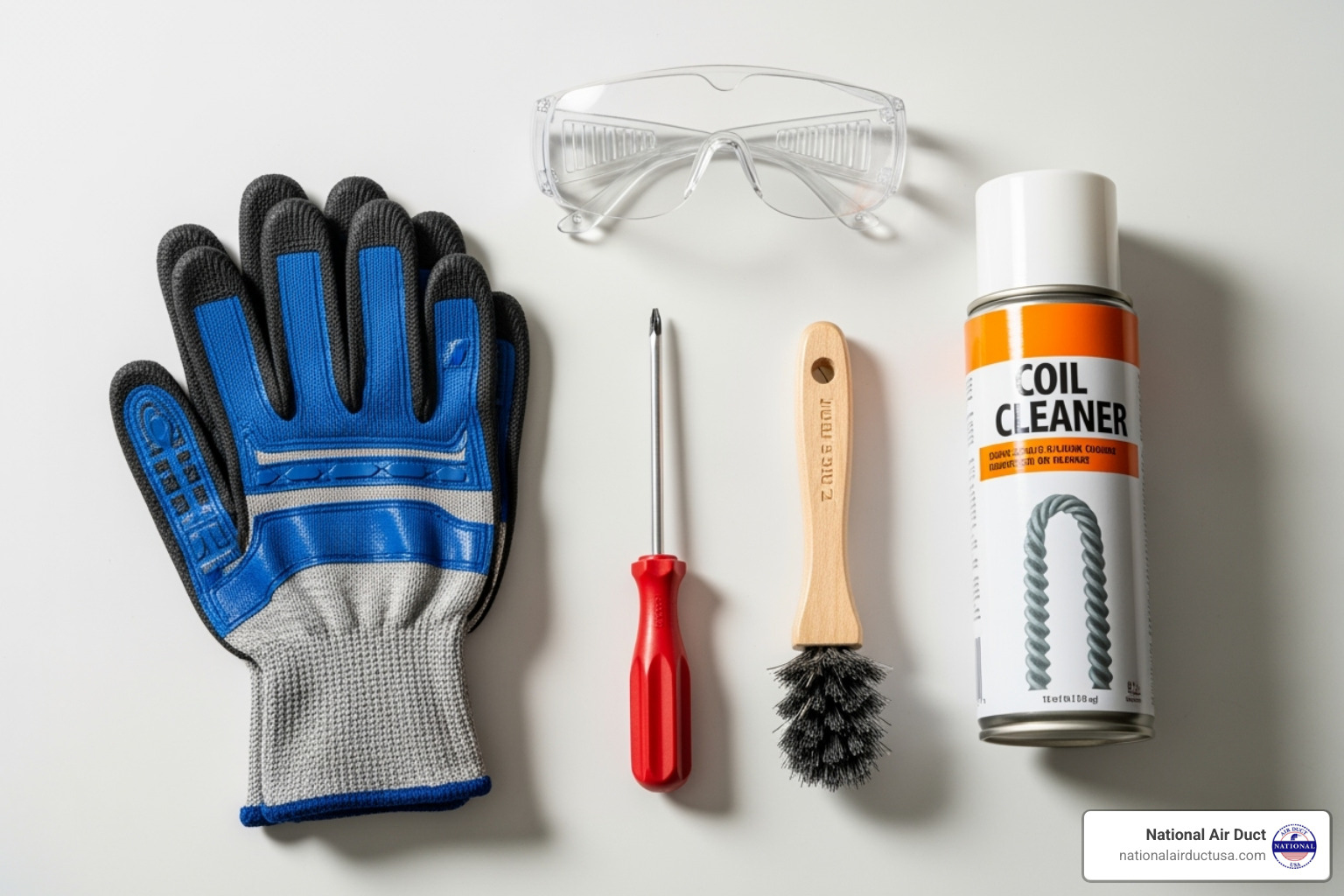
Essential Safety Precautions
Safety first! This step is non-negotiable. A few minutes of preparation can prevent injury, damage to your unit, and costly repairs.
The most critical step is to disconnect power. Unplug the AC unit from the wall outlet. Do not just turn it off with the power button. For extra safety, switch off the corresponding circuit breaker. This prevents accidental shocks during cleaning.
Next, work in a well-ventilated area. Even water-based coil cleaner for window ac units can produce fumes. If possible, work outdoors. If cleaning indoors, open windows and use a fan.
Wear your protective gear. Always use durable gloves and safety glasses or goggles to protect from chemical splashes and debris.
Read product labels thoroughly before you start. Pay attention to instructions, safety warnings, and whether rinsing is required.
Finally, be extremely careful to avoid contact with electrical components. Keep cleaner and water away from wiring, circuit boards, or motor parts, as moisture can cause damage.
The Proper Procedure for Using Coil Cleaner on a Window AC
Once you’ve got safety covered, the actual cleaning process is surprisingly straightforward.
Start by removing the unit’s front grille or cover, which usually involves simple clips or a few screws. Pull out the air filter to be cleaned separately or replaced. This gives you clear access to the evaporator coils (the ones facing into your room). You may need to remove outer casing to fully reach the condenser coils on the back.
Before applying liquid cleaner, use a vacuum with a soft brush attachment to gently remove loose dust and debris from the coil fins. This prevents turning surface dust into a muddy mess.
Now for the main event: applying the cleaner. Shake your coil cleaner for window ac can well. Using a steady spraying technique, apply the cleaner evenly across the coils from about 6 inches away.
Let the cleaner sit for the time recommended on the label, usually 10-15 minutes. You’ll often see the foam change color as it dissolves grime. Do not rush this step.
The rinsing procedure depends on your cleaner. For self-rinsing cleaners, you can often just reassemble the unit and let the AC’s natural condensation flush everything away. Run it on the coolest setting for at least 30 minutes. For manual-rinse cleaners or heavily soiled units, rinse with water. Outside, a gentle garden hose spray works well. Indoors, use a spray bottle and have towels ready. Remember: gentle pressure only to avoid bending the delicate fins.
After cleaning, you might notice some bent fins. A fin comb can gently straighten these, but be very careful.
Once everything is clean and dry, do a final inspection. Reinstall the clean air filter, replace the grille, and secure any outer casings.
For more detailed guidance on AC coil cleaning techniques, check out A guide to cleaning AC coils. If your unit needs professional attention beyond DIY cleaning, National Air Duct USA offers specialized services – learn more at More info about Unit Cleaning.
Common Mistakes to Avoid
Avoid these common mistakes that can reduce cleaning effectiveness or damage your unit:
Forgetting to unplug the unit is a critical safety error. Always disconnect power at the wall outlet and the circuit breaker.
Using high-pressure water is one of the worst things you can do. The delicate aluminum fins bend easily, restricting airflow. Stick to gentle streams.
Watch out for spraying cleaner on electrical parts. Accidentally hitting sensitive wiring or circuit boards with cleaner or water can cause permanent damage.
Not allowing enough time for the cleaner to work is a common mistake. Coil cleaners need time to penetrate and dissolve grime. Rinsing too early leaves dirt behind.
Even with self-rinsing cleaners, skipping the rinsing step on heavy buildup can be ineffective. If your coils were very dirty, natural condensation might not be enough. If you still see dirt or smell chemicals, a gentle manual rinse will finish the job.
Frequently Asked Questions about Window AC Coil Cleaning
Let’s tackle the most common questions we hear from homeowners who want to keep their window AC units running like champions.
How often should I use coil cleaner on my window AC unit?
Here’s the golden rule: clean your coils at least once a year, ideally before summer starts. Think of it as giving your AC a spring tune-up before the heavy lifting begins. This timing ensures your unit is ready to handle those sweltering summer days without breaking a sweat.
But life isn’t always that simple, and some situations call for more frequent attention. If you live in a dusty area or near construction sites, your coils are working overtime to filter out all that grime. In these high-dust environments, twice-yearly cleaning makes perfect sense.
After pollen season is another smart time to break out the coil cleaner for window ac units, especially if anyone in your household deals with allergies. Those yellow dust clouds that coat everything? They’re coating your coils too.
Your AC unit will also tell you when it needs help. Signs of a dirty coil include struggling to cool your room, blowing less-than-cold air, mysterious musty odors, or energy bills that make you do a double-take. When your unit starts sending these distress signals, it’s time for a cleaning regardless of your schedule.
Keeping your air filter clean every month is like giving your coils a bodyguard – it prevents most dirt from reaching them in the first place.
Can I use window AC coil cleaner on my central air or PTAC unit?
The short answer is often yes, but with an important caveat: always check manufacturer instructions first. Many coil cleaner for window ac products are surprisingly versatile. Take the popular AC-Safe foaming cleaner – it works on window units, central air systems, rooftop units, and even RV air conditioners.
The chemistry is usually similar across different AC types, but the application method might vary. Cleaning a massive outdoor condenser coil for your central air system is a different beast than tackling the compact coils in your window unit. You might need a garden hose for the big outdoor unit, while your window unit gets the gentle spray bottle treatment.
Central air systems and rooftop units often have more accessible coils and can handle more aggressive rinsing. Just remember that product suitability depends on the specific cleaner you choose.
PTAC units deserve special mention here. These hotel-style units are more complex than they appear and often need professional attention. Their design and integration into building systems can make DIY cleaning tricky. For comprehensive PTAC maintenance that goes beyond basic coil cleaning, National Air Duct USA offers specialized services at More info about PTAC Cleaning.
Is DIY coil cleaning more cost-effective than professional service?
Let’s talk dollars and sense. A bottle of coil cleaner for window ac units costs around $10-$20, while professional AC maintenance can run $100-$300 or more. From a pure cost of cleaner vs. professional service standpoint, DIY wins hands down.
But here’s where it gets interesting – the real value equation includes more than just money.
Time and effort matter too. DIY cleaning isn’t a quick spray-and-go job. You’re looking at disassembly, cleaning, waiting for the product to work, rinsing (maybe), and reassembly. Factor in drying time, and you could be looking at several hours spread across an afternoon.
Professional technicians bring thoroughness of cleaning that’s hard to match. They have specialized equipment like high-pressure rinsers and inspection cameras. More importantly, they know exactly where dirt likes to hide and how to evict it completely.
Here’s the real kicker: identifying other issues. While you’re focused on the coils, a professional is checking refrigerant levels, inspecting electrical connections, testing drain lines, and spotting potential problems before they become expensive repairs. It’s like getting a full physical exam instead of just checking your blood pressure.
When to call a professional becomes clear in certain situations. Severe mold problems, persistent odors after cleaning, or units that still underperform after your DIY efforts all warrant professional attention. Some problems need more than elbow grease and foam cleaner.
For thorough, professional coil cleaning that addresses your entire system’s health, National Air Duct USA provides comprehensive services designed to maximize efficiency and improve indoor air quality. Learn more at More info about Coil Cleaning.
The bottom line? DIY works great for regular maintenance, but don’t hesitate to call in the pros when your AC needs more than surface-level attention.
Keep Your Cool with a Clean and Healthy HVAC System
When you step back and look at everything we’ve covered, using the right coil cleaner for window ac units really is about so much more than just getting that satisfying blast of cold air on a hot day. It’s like giving your AC unit a spa treatment that pays dividends in ways you might not have expected.
Think about the energy savings alone – when your coils are clean, your unit doesn’t have to work overtime trying to push air through layers of grime and dust. That translates directly to lower electricity bills, which is always a welcome surprise when summer utility costs start climbing. Then there’s the better cooling performance that makes those sweltering afternoons actually bearable, instead of sitting in a room that never quite reaches the temperature you set on the thermostat.
But here’s what really matters for your family’s well-being: healthier air. Clean coils mean you’re not breathing in dust, allergens, and those musty odors that come from mold and mildew buildup. It’s amazing how much fresher your home feels when your AC isn’t circulating contaminated air.
The beauty of regular maintenance is that it’s actually pretty simple once you get into the routine. A yearly cleaning with quality coil cleaner, combined with monthly filter changes, keeps your window AC humming along efficiently for years. It’s one of those small investments that saves you from much bigger headaches down the road.
Of course, there are definitely times when DIY isn’t enough. Maybe you’ve tackled the cleaning yourself but still notice persistent odors, or perhaps your unit has some hard-to-reach areas that need professional attention. Sometimes the issue goes deeper than what a homeowner can safely handle.
That’s where National Air Duct USA comes in. We’ve built our reputation on understanding that clean HVAC systems are the foundation of a healthy home environment. Our team focuses on improving indoor air quality and system efficiency through professional, comprehensive, and affordable solutions designed specifically for residential clients like you.
If you’re in Westbury, NY, New York, or anywhere in the surrounding areas, and you’re ready to take your home’s air quality to the next level, we’re here to help. Beyond just cleaning individual units, we can Learn how we can disinfect your entire HVAC system – giving your whole home a fresh, clean start that you’ll notice the moment you walk through the door.
Your window AC unit works hard to keep you comfortable. With the right care and professional support when you need it, it’ll keep delivering that cool, clean air that makes your home the perfect retreat from whatever the weather throws your way.

